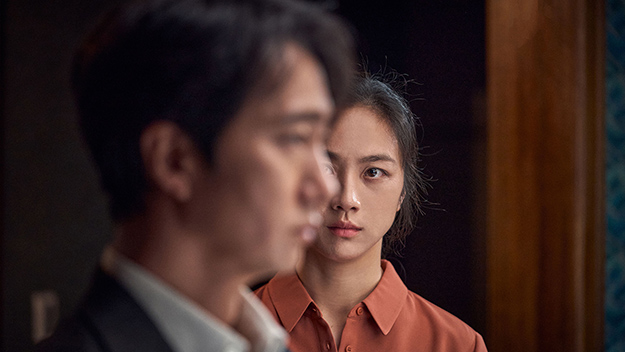Cannes 2022: Dont Look Back
This article appeared in the May 24, 2022, Cannes Film Festival special edition of The Film Comment Letter, our free weekly newsletter featuring original film criticism and writing. Sign up for the Letter here. Catch up on all of our coverage of the 2022 Cannes Film Festival here.

Decision to Leave (Park Chan-wook, 2022)
I first attended Cannes in 1993, the year of The Piano and Farewell My Concubine. That would make this 75th festival my 30th May here—if last year’s hadn’t happened in July, and if the previous year’s festival hadn’t been an apocryphal phantom edition. In the early ’90s, you could still run into some of those venerable journos who would grumble about how much better Cannes used to be, and how easy it once was to get an interview with Fellini or John Ford just by wandering up to them in the Carlton lobby.
I suppose I’m one of those grizzled types now. So what did I think was better about Cannes back then? It was cheaper and more spontaneous. The coronavirus break seems to have intensified the progressive Times Squarification of a town which used to have plenty of quiet, informal corners for quick meals and coffees; many establishments near the Palais have shut down and many glossier venues have opened up, welcoming a glam young crowd and making some streets resemble a permanent Eurovision afterparty. And the spontaneity has gone partly because COVID brought a new ticketing system, which means that you book online four days ahead, from 7am daily; and you by and large stick to your bookings, with no more impromptu rushing off to see something a friend just recommended.
One thing I don’t miss about ’90s Cannes, though, was the way that the Competition was loaded with ponderous prestige statement films, two-hour-plus mountains that you dutifully clambered over. Unfortunately, the era of the white elephant seems to have returned this year, with several hefty, solemn oeuvres, worthy or otherwise. The most egregious was Tchaikovsky’s Wife, by Kirill Serebrennikov, about the tormented marriage of Antonina Miliukova, spouse to the composer. As a study in exquisitely staged anguish, it was occasionally magnificent, often preposterous, largely ponderous, and its inclusion seemed a misstep. Given the current strong feelings in favor of an embargo on Russian cinema, what was arguably needed from that country was a film that said something, no matter how obliquely, about the current state of the world, rather than a self-indulgent emotional epic—even if feminist, even if made by a non-Putinite director (unless, of course, you read Tchaikovsky’s treatment of Antonina as an allegory of the president gaslighting his nation).
In a somewhat muddy Competition, three films have stood out so far. One is EO, Jerzy Skolimowski’s reimagining of themes relating to Robert Bresson’s donkey calvary Au hasard Balthazar. In no way a remake, this was a flamboyant, visionary work: while its quadruped hero’s odyssey didn’t in itself reveal anything new about animal consciousness, its execution—including drone shots set to blazing red filters—and wayward, fragmented narrative showed an energy that little else here has shared. Corny but true: the wildest, youngest film in the lineup was made by an 84-year-old director up for anything. And if you ever wondered how Isabelle Huppert smashes plates, EO shows you: with perfect lofty insouciance, of course.
The absolute standout in competition is R.M.N. by Romania’s Cristian Mungiu, who won the Palme d’Or in 2007 with 4 Months, 3 Weeks and 2 Days. It’s a sometimes confusing story— that’s part of the appeal—about unrest in a small Transylvanian town with strong cultural and population links to Hungary and Germany. Its protagonist Matthias (Marin Grigore) is a Roma man working abroad who punches out a co-worker at the start because of a racist remark, but seems to take similar remarks in stride when he returns to his hometown. There, his young son has been traumatized by something he’s seen in the woods, while unrest is brewing because the population objects to three Sri Lankan workers being employed by the local bakery. The film plots rising tensions, woven in with Matthias’s troubled extramarital relationship with middle-class Csilla (Judith State). Mungiu knows exactly how to orchestrate scenes, and knows exactly how long they should last, notably in an extended one-take sequence of a community meeting. A sustained moment of structured theatricality, it’s a terrifying illustration of the peculiar genius of bigotry, which contrives inventively and unrelentingly to latch onto any crazy point it can use to shout down the opposition. R.M.N. says more about the current hate-ridden state of the world—and not just Europe—than any film here, and induces a phenomenal sense of unease. At this point, I’d bet on it for Mungiu’s second Palme.
Also outstanding in competition: Park Chan-wook’s Decision to Leave, one of those blasts of cinematic flamboyance that you swoon over, even when it doesn’t entirely make sense. A fevered Hitchcockian “Liebestod,” the film follows an insomniac cop (Park Hae-il) addicted to murder cases, who falls for the Chinese wife (Tang Wei) of a man whose death he’s investigating. There’s a dizzy—dare I say, vertiginous?—mannerism to the visuals and the storytelling that could easily be off-putting, and some undeniable abuse of flashbacks and mobile-phone data. But Park is at his most exuberant here, engineering outrageous cuts between shots that seem to contain more clues and half-concealed resonances than the mind can quite take in. I can’t wait to see it again.
Talking of stories of cops haunted by unsolved cases, a mention for The Night of the 12th, in the Cannes Premiere section: Dominik Moll’s Chabrolian, ostensibly trad policier about two cops (Bastien Bouillon and Bouli Lanners) trying to solve a young woman’s murder. It’s taut and cleanly executed, and you keep thinking, Yes, but it’s so male. Then Moll flips the picture, introducing Anouk Grinberg as the examining magistrate who kicks the case back into shape, and the film comes into focus as a commentary on why thrillers assume men are best qualified to investigate male violence.
Elsewhere, in Directors’ Fortnight, a gentle gust of sheer simplicity: the Tunisian-set Under the Fig Trees, by Erige Sehiri, which tracks a day out with a group of orchard workers, basically shooting the breeze under the boughs. What makes it special, apart from the brilliantly controlled and varied way in which Sehiri uses this very basic locale, is the nonprofessional cast, ranging from an eccentric old-timer to a group of teenagers recruited from a local high school, who radiate charm and life—notably the three Fdilhi sisters, Ameni, Fide, and Feten. The teenagers chat about who fancies whom, who’s broken whose heart, the usual high-school stuff—but in the context of an Islamic culture, it flouts expectations (and of course, the way headscarves are tied or let loose speaks volumes about the girls’ desire). In a Cannes of somewhat thin pickings, this quietly emerged as one of the most flavorful fruits in the orchard.
Jonathan Romney is a critic based in London. He writes for the Observer, Sight & Sound, Screen Daily, and others, and teaches at the National Film and Television School.







